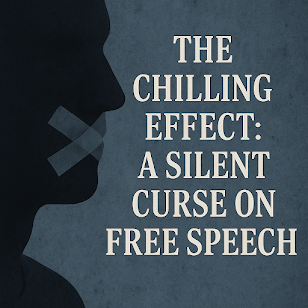The Chilling Effect: A Silent Curse on Free Speech
INTRODUCTION
The chilling effect means people refrain from speaking up or expressing their views, thoughts, opinions, or criticism on any matter, especially government matters, not because what they are saying is illegal, but because the law is very vague. The definition of hate speech is very unclear, subjective, and broad, so people fear legal consequences even for lawful speech, which gives a chilling effect on freedom of speech.
Multiple interpretations of hate speech led people to be overly cautious or even silent about their lack of speaking up; this is a clear infringement of Article 19(1)(a), which is freedom of speech.
HOW VAGUE LAWS CREATE THIS FEAR?
Unclear language
As we don't have any clear definition of hate speech and use only generic or undefined terms like offensive, annoying, obscene, hatred, disharmony, etc., this creates confusion and results in a chilling effect on free speech.
Self censorship
To avoid the legal consequences, people censor themselves and do not even pass or present any views that are even lawful, valid or socially important.
Discretionary enforcement
With this, police and higher authorities get wide discretion to decide what counts as illegal according to their need, especially in matters of criticism of government and public orders. This unpredictability increases fear among citizens and results in a chilling effect.
Unequal application
These vague laws can be selectively applied against activists, journalists, or political opponents, leading to fear among people who hold unpopular views.
HOW VAGUE LAWS BECOME A CURSE FOR SOCIETY?
Vague laws are a curse for society because they directly violate a person's right to freedom of speech. When someone tries to speak the truth or share genuine, lawful opinions, especially when those views criticize a government rule, policy, or official, the unclear wording of the law can wrongly make such speech seem illegal.
Today, many people who express their disagreement with government actions online face strict punishment, not because their speech is truly harmful, but because the laws are applied unequally and used at the discretion of authorities. This kind of misuse needs to stop.
When people are afraid to speak up, it leads to a serious threat to democracy. It creates an environment where the government cannot be questioned, and that opens the door to dictatorship, where people no longer feel free or safe to express their views.
HOW CAN THIS BE IMPROVISED?
To fix this issue, the first step is to clearly define what hate speech means. Right now, the laws are too vague, and because of that, even people who are just sharing truthful and lawful opinions can get into trouble. The government must ensure that these laws are applied fairly and equally, without any bias or misuse by authorities. This will help people feel safe to speak freely, without the fear of being arrested or punished just for stating real facts.
However, this doesn’t mean that people should be allowed to spread hate or violence. Spreading hatred among communities or religious groups should still be punishable, but there’s a big difference between hateful speech and simply pointing out facts that expose injustice, corruption, or human rights violations.
There should also be no discrimination in how these laws are applied. Whether someone is a common citizen or a powerful person, the law must treat everyone equally. Only then can we protect the true meaning of free speech in a democratic society and make sure people are not silenced for speaking the truth.
CONCLUSION
Free speech is the foundation of a strong democracy, but vague laws and their misuse create fear and silence. People start holding back the truth to avoid punishment. To fix this, hate speech must be clearly defined, laws must be applied equally, and misuse must stop. Only then can citizens speak freely without fear, and democracy truly thrive.




Comments
Post a Comment